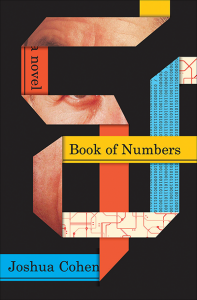Book of Numbers

BOOK BY JOSHUA COHEN
RANDOM HOUSE, 2015
580 PP.; $28.00
Midway through Joshua Cohen’s latest novel, Book of Numbers, a man unsuccessfully searches online to find the object of his affection: an abaya-wearing woman with whom he is falling in love, or at least lust. This woman’s inaccessibility—the mystery of the unknown, the unseen, the unGoogleable—drives the central character’s dangerous pursuit. In Cohen’s dark vision, all are searching for something, and the beauty—and danger—of the Internet is the ease with which most things can be found: the things we want, not necessarily the things we need.
Book of Numbers tells the story of, well, Joshua Cohen—not the novelist himself, but a sort of alternate reality self, as well as Cohen’s newest employer, whose name is also Joshua Cohen. This third Cohen is a tech billionaire and the eccentric figurehead of a Google-like corporation. The former Cohen has been tasked with writing the latter Cohen’s biography. Got that? That’s three Joshua Cohens (or, as the novel asks, is that Joshuas Cohen?) for the price of one hardback. And the novel is certainly meant to be read in hardback; the opening line tells readers using digital devices to “fuck off,” then digresses into a disparagement of the paperback form. Maybe Cohen needs the cash.
What follows in Book of Numbers is a clever, self-aware romp through the history of the 1980s tech boom till the age of the Internet. It’s also the story of a lonely porn addict pulled into a deadly conspiracy. It’s also the recorded confession of a man examining the strange curvature of his life in an era when the promise of salvation—or the deepest debauchery—are just an Internet search away. Is it a thriller? A black comedy? A tragedy? The answer is yes.
Pretention and ambition are thinly divided cousins, and Cohen can be easily accused of both before the novel’s more than 500 (arguably overwritten) pages resolve the narrative. The text mirrors the sensation of multiple windows open in an Internet browser: a distracted overload of information, some of it with only the thinnest relationship to the plot. Cohen’s voice is complex, with ambitiously baroque sentences, the structures of which are sometimes a challenge to map.

Joshua Cohen (photo by Beowulf Sheenan)
Cohen asks what it means to be human when every square inch of our lives is up for scrutiny—especially when, more often than not, we’re the ones who willingly offer this information up for consumption via Facebook, Twitter, Instagram, and even our less-than-private search histories. His answer is a complicated one. On the one hand, the Internet represents a certain pinnacle of human invention. Cohen’s novel is respectfully steeped in the language of this invention, showing off a dizzying depth of understanding for the mechanics of computer processing, coding, and what makes the Internet tick. Yet increasingly, Cohen argues, the complexity of a human being can be reduced to a social media profile, an avatar, or a series of search queries out in the ether. As we spend more of our lives plugged into these interfaces, we worship at the altar of a false self: how we wish we were, how we want to be perceived.
Speaking of altars, religious imagery punctuates the novel, from the eponymous fourth book of the Torah to rabbinic literature, Islamic modesty laws, Hindu spirituality, the disparities of Eastern and Western Buddhism, and more. Yet the approach is humanistic; these references demonstrate humanity’s toxic history of searching outside itself for answers, for meaning, for fulfillment: then, it was God; now, it’s the Net. Cohen also mocks New Age pop spirituality with his portrayal of vapid, latte-sipping meditators whose self-infatuation negates any capacity for actual growth: consumption and excess designed as spirituality. Whether Cohen’s portrayal is deep enough to be entirely fair, his skepticism is a consistent running thread throughout the novel.
By its dénouement, readers will have been baptized in tech jargon and will emerge—what? Not enlightened, not exactly. In fact, it’s hard to say what readers will take away from Book of Numbers given its depth and scope. This reviewer left with a somber sense of how all-encompassing the Internet has become and more self-awareness of how dependent we are upon it for entertainment, education, and the construction of our identities. This isn’t exactly news, though Cohen sells it as a revelation by sheer breadth of words. If anywhere, it’s here that the novel falters. Somewhere between the transition from double memoir to political thriller, the human element ironically becomes strangled. The heartbeat, the emotional core of the novel, struggles to be felt amidst the intrigue, the fight for truth, and the tenuous resolution.
Yet something suggests this is entirely the point: in a world where the self is commoditized, where identity is constructed around the two great pillars of consumerism and the Internet, a suffocation occurs. Are we too far gone? To Cohen at least, the answer is uncertain.
